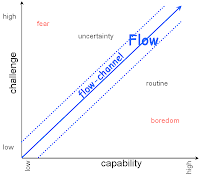The balance of challenge and capability ...
Collectively organized groups in modern working environments have to respond to more or less the same type of challenges like the archaic wolfs pack in the free wild nature.Within western style economies and even more in the emerging Asia a fierce competition among corporations forces them to put the best of the grip on the top position and every one else to the position where he / she fits best in terms of the overall sustaining group success.
But there is more to it. While the single wolf needs not to be motivated to contribute to the packs overall success it is different when it comes to people in a typical working environment.
Much has been written about how to motivate employees, about Douglas McGregors X-, and Y-type employees or William Ouchis Z-type variant. But it was evolutionary biology again which told us, that there is an archaic underlying force on instinct level which highly influenced motivation at work: curiosity.
- Curiosity is a general human trait.
- It can be found with animals as well.
- Evolutionary biology tells us that curiosity is driven by safety needs.
- This means curiosity explores the unknown and hereby generates the necessary safety.
- Successes achieved along this way result in a deep satisfaction, called flow.
- Flow generating works is perceived as being satisfactory.
- Work organized according to the principles of Frederick Winslow Taylor which is reduced to purely operational tasks and stripped off any self controlling elements become routine - or even boring.
- A too demanding (unknown) task however generates uncertainty, uneasy feelings or even fear.
- And there in-between the optimal path is located the flow-channel, where the challenge meets the workers capabilities - and stretched them a little bit; where work is fun.
- Self-determined work in a dynamically changing environment needs to be positioned within the flow-channel.
But it is a very intrinsic motivation. You cannot clumsily motivate a person by offering him money or privileges. It will at least not sustain and will not raise his self esteem. Rather it has the smell of being bribable.
Accepting the wide spread insight that motivated workers - flow workers - deliver better results, and contribute more to the collectives common success, we need to tailor the work place and the tasks assigned in a way, that they may enable flow.
Achieving optimal performance in the growing knowledge worker model seems to be highly dependent on reaching the flow state. Traditional leadership styles will probably not be the optimal response to this development. A different way of working will need a different leadership style resulting in a changed corporate culture. The good news is that this culture could well be in line with our basic instincts.




